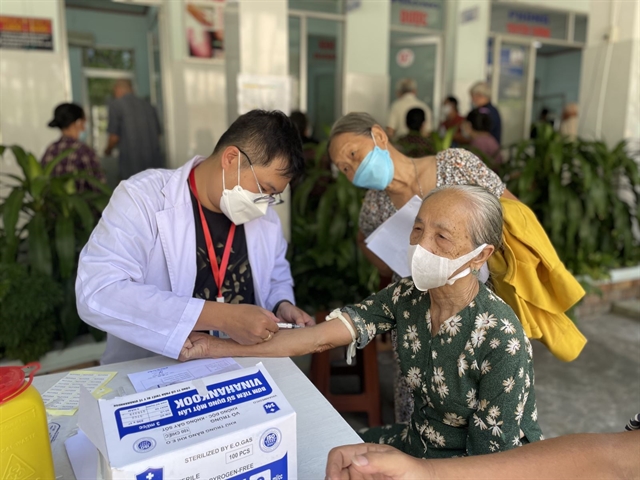 Society
Society


|
| Elderly residents in HCM City receive free annual health check-ups as part of a city-wide preventive care programme. — VNA/VNS Photo |
HCM CITY — Việt Nam’s largest metropolis is expanding its free annual health check-up programme for residents aged 60 and above, allocating approximately VNĐ150 billion (US$6.2 million) each year.
The initiative is open to all senior citizens, regardless of whether they hold permanent or temporary residence status in the city.
The programme, managed by the HCM City Department of Health, offers comprehensive annual health screenings for nearly one million elderly residents, covering clinical assessments, basic laboratory tests, and screenings for common age-related conditions such as hypertension, diabetes, cardiovascular disease, cancer, COPD, and dementia.
Test results are typically available within 24 to 48 hours, followed by medical consultations or referrals where necessary.
All data is integrated into the city’s community health management system, allowing for continuous monitoring and early intervention.
Officials estimate the programme could lead to the early detection of around 160,000 cases of hypertension and 91,000 potential diabetes cases, affecting an estimated 15 per cent and 8 per cent of the senior population, respectively.
Over 95 per cent of detected cases are expected to be enrolled in ongoing management and treatment programmes at local healthcare facilities.
All healthcare personnel involved are receiving training, and 100 per cent of screening and diagnostic data will be recorded in real time on the city’s health database.
Public and private clinics meeting the required standards will also be mobilised to participate.
To maximise participation, local authorities are compiling resident lists and issuing direct invitations to households, while coordinating with families, civil society groups, and volunteers to encourage attendance.
For frail or immobile seniors, home visits and mobile medical services are provided.
The city began piloting the initiative in 2023 and expanded it citywide in 2024.
As of mid-2025, over 526,000 seniors have been screened, identifying more than 49,000 with hypertension and over 26,000 with suspected diabetes.
Last month, the city People's Committee confirmed that the programme would be expanded to include elderly individuals in recently merged areas from Bình Dương and Bà Rịa-Vũng Tàu provinces, with further funding details pending.
National health policy shift
The city’s initiative aligns with Việt Nam’s broader healthcare reforms, outlined in a recent Politburo resolution, which envisions free annual health screenings for all citizens starting in 2026, and basic hospital services covered under national health insurance by 2030.
The resolution emphasises shifting the healthcare system’s focus from treatment to prevention, aiming to improve population health, life expectancy, and quality of life. It sets ambitious goals for the next 25 years.
They include an average life expectancy of 75.5 years by 2030 and over 80 years by 2045; at least 68 years of healthy life by 2030; height increases of at least 1.5 cm among children and adolescents; over 95 per cent vaccination coverage; and expanded public health infrastructure, especially at the grassroots level.
Under the plan, every citizen will have a personal electronic health record, and the government will invest in primary care, preventive medicine, digital health, and workforce development.
By 2030, all commune-level clinics are expected to have at least four to five doctors, with 1,000 doctors deployed annually to underserved areas.
The resolution also calls for increased private sector involvement, particularly in high-tech hospitals, with tax exemptions for non-profit facilities, and mandates significant upgrades to both public and private healthcare services.
The central government will oversee implementation, with the Ministry of Health coordinating with national defence and public security forces to extend services to all sectors of the population. — VNS




